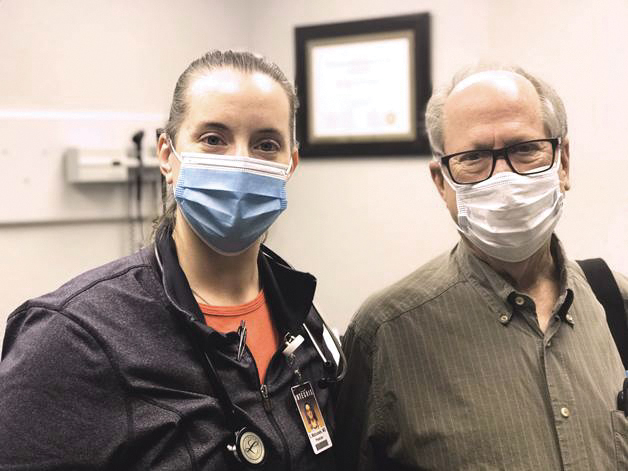On June 27, his forty-fifth anniversary of ordination to priesthood, Father Mark Mason began experiencing chills despite the fact that it was nearly 100 degrees outside. He thought perhaps he was having an allergic reaction to the hot herbal tea he was sipping. It wasn’t his usual orange spice. He tried putting on heavier clothing and went to lay down, but the chills persisted – even under thick blankets.
Mason had a houseguest at the time, and as his condition deteriorated that evening, the guest made the wise decision to take him to the INTEGRIS Bass Baptist Health Center Emergency Department.
Throughout the COVID-19 pandemic, identifying symptoms of the virus has been like trying to hit a moving target. A fever over 100.4 was one of the telltale signs early on, but chills didn’t make the list until April. Fortunately, by June, INTEGRIS emergency caregivers were well-versed in the multiple symptoms of COVID-19 so they tested Mason for the virus right away. He tested positive.
Mason knew precisely when he had been exposed to COVID-19. He had recently eaten dinner with individuals who later tested positive. They were all asymptomatic at the time of the meal. Mason had planned on getting tested himself, but the virus beat him to it.
After spending a few hours at INTEGRIS, Mason began to improve. Because his symptoms were not serious enough for him to be admitted, he was sent home and told to self-quarantine, which he did. Something that is not easy to do when you are a Catholic Priest at multiple parishes, including St. Francis Xavier and St. Gregory Catholic Church.
Mason was recovering well at home. It had been several days since his diagnosis, and he thought he was over the worst of it. But he underestimated the power of the illness.
On day 10, he wasn’t feeling well. His doctor, INTEGRIS physician Jon Mills, D.O., recommended he use a pulse oximeter to measure his blood oxygen levels at home since, at 71 years old, Mason is at higher risk of serious complications from the virus.
His blood oxygen levels were falling, and he was having trouble breathing. At the urging of Dr. Mills, he returned to the Emergency Department at Bass and was quickly admitted. Mason spent 15 days at INTEGRIS recovering from COVID-19 —eight of those days were in the Intensive Care Unit.
Mason was placed in a negative air flow room, a room that pulls air inward from the hallway, to decrease the risk of him infecting other patients. INTEGRIS had already prepared for patients like Mason by converting extra rooms to negative air flow and made additional preparations in the event of a surge.
Mason narrowly escaped being put on a ventilator but was given a life-saving cocktail of Remdesivir, convalescent plasma, steroids and anti-inflammatories.
“I was very lucky to be at this hospital when I came down with COVID-19,” declared Mason. “I feel like I received the best treatment in the world.”
“Father Mason is a great example of how quickly patients with COVID-19 can become severely ill,” said INTEGRIS pulmonologist, Sarah Matousek, M.D. The team of pulmonologists at INTEGRIS were key players in his survival. “Part of the reason he did so well was because he was in good physical shape prior to his illness, but he also stayed in in touch with his physician and they closely monitored his symptoms, taking action when necessary.”
Mason was released from the hospital on July 23. He continues to have lingering effects from COVID-19 but is certainly on the road to recovery. He wants to thank everyone involved in his care, especially his team of caregivers in the ICU, Edward Payton, Hannah Kokojan and Alaina Maxey. He is also grateful to the Enid community for their continued prayers, as he feels confident the community played a major role in his success.














